| Listing 1 - 10 of 20 | << page >> |
Sort by
|
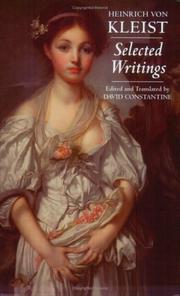
ISBN: 0872207439 9780872207431 Year: 2004 Publisher: Indianapolis Hackett
Abstract | Keywords | Export | Availability | Bookmark
 Loading...
Loading...Choose an application
- Reference Manager
- EndNote
- RefWorks (Direct export to RefWorks)
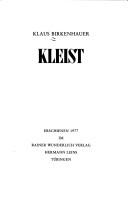
ISBN: 380520289X Year: 1977 Publisher: Tübingen Leins
Abstract | Keywords | Export | Availability | Bookmark
 Loading...
Loading...Choose an application
- Reference Manager
- EndNote
- RefWorks (Direct export to RefWorks)
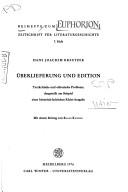
ISBN: 3533024350 9783533024354 Year: 1976 Volume: 7 Publisher: Heidelberg: Winter,
Abstract | Keywords | Export | Availability | Bookmark
 Loading...
Loading...Choose an application
- Reference Manager
- EndNote
- RefWorks (Direct export to RefWorks)
Editing --- Kleist, Heinrich von, --- Criticism, Textual --- 82.083 --- 830 "18" VON KLEIST, HEINRICH --- Authorship --- Teksteditie. Editiewetenschap --- Duitse literatuur--19e eeuw. Periode 1800-1899--VON KLEIST, HEINRICH --- Kleist, Heinrich von --- -Criticism, Textual --- Editing. --- 830 "18" VON KLEIST, HEINRICH Duitse literatuur--19e eeuw. Periode 1800-1899--VON KLEIST, HEINRICH --- 82.083 Teksteditie. Editiewetenschap --- Kleist, Heinrich von, - 1777-1811 - Criticism, Textual --- Kleist, Heinrich von, - 1777-1811
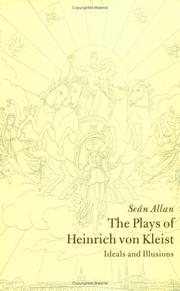
ISBN: 0521495113 0521025044 0511519400 Year: 1996 Publisher: Cambridge ; New York, NY : Cambridge University Press,
Abstract | Keywords | Export | Availability | Bookmark
 Loading...
Loading...Choose an application
- Reference Manager
- EndNote
- RefWorks (Direct export to RefWorks)
This is an accessible 1996 study of the plays of Kleist (1777-1811), who ranks with Goethe and Schiller amongst nineteenth-century authors and who has been a major influence on contemporary German writers. Seán Allan examines Kleist's critique of the aspirations of both Enlightenment and Romantic metaphysics, notably his suggestion that the pursuit of 'transcendent' ideals of perfection constitutes a formidable obstacle to genuine progress in human affairs. In so doing, he offers resolutions of a number of long-running controversies in Kleist criticism, as well as summarizing the state of research on all the plays. The book includes discussion of two plays usually neglected by scholars - Das Käthchen von Heilbronn and Die Hermannsschlacht. All quotations are given in both German and English and full references are given to published English translations of Kleist's works as well as to the German originals.
Arts and Humanities --- Literature --- Kleist, Heinrich von, --- Criticism and interpretation. --- von Kleist, Heinrich --- Kleĭst, Genrikh, --- Kleist, Bernd Heinrich Wilhelm von, --- Kleist, H. V. --- Ḳlaisṭ, Hainrikh fun, --- קלייסט, היינריך --- קלייסט, היינריך פון, --- קלייסט, הינריך פון,
Book
ISBN: 1282795651 9786612795657 1571137424 1571134220 Year: 2009 Publisher: Rochester, N.Y. : Camden House,
Abstract | Keywords | Export | Availability | Bookmark
 Loading...
Loading...Choose an application
- Reference Manager
- EndNote
- RefWorks (Direct export to RefWorks)
Controversial during his lifetime as well as among today's scholars and critics, the German dramatist and writer of novellas Heinrich von Kleist (1777-1811) remains an enigma. Was he a Romantic or a Classic? A conservative or a liberal? What is his status in the literary canon? Because of their enigmatic qualities, Kleist's writings have attracted the attention of critics and theorists from well beyond the narrow confines of German literary studies: comparatists, historians, philosophers, legal scholars, and even musicologists and dance historians. And outside academia his writings are as popular as ever. This book scrutinizes for the first time a key element in Kleist's thought and poetic process: his obsession with the problem of passivity. Scholars have long been attracted to the dynamic, larger-than-life characters in Kleist's fiction and drama, overlooking the fact that Kleist's works often turn on moments of stasis, as these same protagonists are suddenly and sometimes brutally rendered passive. Through a careful, historically grounded, and original investigation incorporating extensive primary research in late-Enlightenment natural philosophy and eighteenth-century medical practices, the study sheds light on these nodal points in Kleist's work, contending that these structures of passivity are so pervasive and so systematic in his work that they can justifiably and profitably be viewed as constituting a kind of poetics. Steven R. Huff is associate professor in the Department of German at Oberlin College.
Passivity (Psychology) in literature. --- Kleist, Heinrich von, --- Kleĭst, Genrikh, --- Kleist, Bernd Heinrich Wilhelm von, --- Kleist, H. V. --- Ḳlaisṭ, Hainrikh fun, --- קלייסט, היינריך --- קלייסט, היינריך פון, --- קלייסט, הינריך פון, --- Criticism and interpretation. --- von Kleist, Heinrich
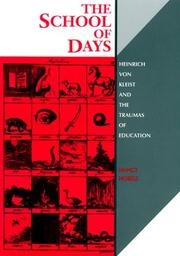
ISBN: 0814328237 9780814328231 Year: 1999 Volume: *2 Publisher: Detroit Wayne State University Press
Abstract | Keywords | Export | Availability | Bookmark
 Loading...
Loading...Choose an application
- Reference Manager
- EndNote
- RefWorks (Direct export to RefWorks)
Ecoles dans la litterature --- Education dans la litterature --- Education in literature --- Opvoeding in de literatuur --- Scholen in de literatuur --- Schools in literature --- Education --- -Education --- -Education in literature --- 830 "18" VON KLEIST, HEINRICH --- Children --- Education, Primitive --- Education of children --- Human resource development --- Instruction --- Pedagogy --- Schooling --- Students --- Youth --- Civilization --- Learning and scholarship --- Mental discipline --- Schools --- Teaching --- Training --- Philosophy --- -History --- -Philosophy --- -Duitse literatuur--19e eeuw. Periode 1800-1899--VON KLEIST, HEINRICH --- Kleist, Heinrich von --- -Knowledge --- Erziehung. --- Pädagogik. --- Pädagogik --- Kleist, Heinrich von. --- Kleist, Heinrich von, --- 830 "18" VON KLEIST, HEINRICH Duitse literatuur--19e eeuw. Periode 1800-1899--VON KLEIST, HEINRICH --- Duitse literatuur--19e eeuw. Periode 1800-1899--VON KLEIST, HEINRICH --- History --- Kleist, H. V. --- Ḳlaisṭ, Hainrikh fun --- Kleĭst, Genrikh --- Kleist, Bernd Heinrich Wilhelm von --- Knowledge --- Education. --- von Kleist, Heinrich --- Kleist, Heinrich Wilhelm von --- Germany --- 18th century --- 19th century --- Kleist, Heinrich von, - 1777-1811 - Knowledge - Education. --- Education - Germany - Philosophy - History - 18th century. --- Education - Germany - Philosophy - History - 19th century. --- Kleĭst, Genrikh, --- Kleist, Bernd Heinrich Wilhelm von, --- Ḳlaisṭ, Hainrikh fun, --- קלייסט, היינריך --- קלייסט, היינריך פון, --- קלייסט, הינריך פון,
Book
ISBN: 9781571135544 1571135545 9781571138415 1571138412 1283836475 Year: 2012 Publisher: Rochester, New York Camden House
Abstract | Keywords | Export | Availability | Bookmark
 Loading...
Loading...Choose an application
- Reference Manager
- EndNote
- RefWorks (Direct export to RefWorks)
Heinrich von Kleist is renowned as an author who posed a radical challenge to the orthodoxies of his age. Today, his works are frequently seen to relentlessly deconstruct the paradigms of Idealism and to reflect a Romantic, even postmodern, perspective on the ambiguities of the world. Such a view fails, however, to do full justice to the more complex manner in which Kleist articulates the tensions between the securities of Enlightenment thought and the anxieties of the revolutionary age. Steven Howe offers a new angle on Kleist's dialogue with the Enlightenment by reconsidering his investment in the philosophy of Jean-Jacques Rousseau. Where previous critics have trivialized this as intense but fleeting and born of personal identification, Howe here establishes Rousseau's importance as a lasting source of inspiration for the violent constellations of Kleist's fiction. Taking account of both Rousseau's critique of modernity and his later propositions for working toward the Enlightenment promise of emancipation, the book locates a mode of discourse which, placed in the historical context of the French Revolution and Napoleonic Wars, sheds new light on the political and ethical issues at play in Kleist's work. Steven Howe is Associate Research Fellow at the University of Exeter, UK. He is co-editor, with Ricarda Schmidt and Seán Allan, of 'Heinrich von Kleist: Konstruktive und Destruktive Funktionen von Gewalt' (forthcoming, 2012).
830 "18" VON KLEIST, HEINRICH --- 830 "18" VON KLEIST, HEINRICH Duitse literatuur--19e eeuw. Periode 1800-1899--VON KLEIST, HEINRICH --- Duitse literatuur--19e eeuw. Periode 1800-1899--VON KLEIST, HEINRICH --- von Kleist, Heinrich --- Rousseau, Jean Jacques --- Rouseau, Jan Jakub, --- Russo, Zhan Zhak, --- Rousseau, John James, --- Rūssū, Jān Jāk, --- Lu-so, --- Ru-xô, Giăng-Giá̆c, --- Rousseau, Jean Jaques, --- Rousseau, Jean Jeacques, --- Rousseau, J. J. --- Rusō, Jan Jakku, --- Rousseau, Gian Giacomo, --- Ruso, Z'an Z'aḳ, --- Rūcō, --- Citoyen de Genève, --- Citizen of Geneva, --- Roussō, --- Rousseau, --- Rūssō, --- Rousseau, Johann Jacob, --- Руссо, Жан-Жак, --- רוסא, זשאן־זשאק --- רוסא, י׳ן י׳ק, --- רוסו, זאאן זאאק, --- רוסו, ז׳אן־ז׳אק, --- روسو، چان چاك --- روسو، ژان ژاك --- 卢梭, --- Rousseau, Juan Jacobo, --- Rousseau, G. G. --- Ruso, Jan Jak, --- Rūsaw, Zhān Zhāk, --- Rūsū, Zhān Zhāk, --- Kleist, Heinrich von, --- Kleĭst, Genrikh, --- Kleist, Bernd Heinrich Wilhelm von, --- Kleist, H. V. --- Ḳlaisṭ, Hainrikh fun, --- קלייסט, היינריך --- קלייסט, היינריך פון, --- קלייסט, הינריך פון, --- Criticism and interpretation. --- Rousseau, Jean-Jacques --- Rousseau, Jean-Jacques, --- BIOGRAPHY & AUTOBIOGRAPHY / Literary. --- Enlightenment thought. --- French Revolution. --- German literature. --- Heinrich von Kleist. --- Identity. --- Jean-Jacques Rousseau. --- Napoleonic Wars. --- Nation. --- Violence. --- ethical discourse. --- modernist literature. --- political and ethical issues. --- political discourse. --- radical challenge. --- revolutionary age.
Book
ISBN: 9789042037816 9042037814 1306315492 9401210306 9789401210300 9781306315494 Year: 2013 Volume: 170 Publisher: Amsterdam New York Rodopi
Abstract | Keywords | Export | Availability | Bookmark
 Loading...
Loading...Choose an application
- Reference Manager
- EndNote
- RefWorks (Direct export to RefWorks)
In an authorial class with dramatists and authors of literary prose such as Goethe, Schiller, Thomas Mann, Brecht, and Kafka, Heinrich von Kleist (1777-1811) remains prominent in international evaluations of artistic genius when measured by enduring popular and artistic reception; legal, philosophical, and scientific criticism; and resonance of political rage. Scholars have long been fascinated by Kleist’s biography and works, in no small part due to his influence on authors, philosophers, political thinkers, and filmmakers, who regard Kleist as among the most accessible of “classic” artists — one whose relevance requires neither theoretical introduction nor literary-historical justification. The present volume addresses two centuries of engagement with Kleist and his works from an angle that has proven most important to their popular canonical status — his artistic and political legacies. What mattered to Kleist has mattered to centuries of readers, and thus all the more to artists and thinkers with similarly urgent messages to convey.
Kleist, Heinrich von, --- Criticism and interpretation. --- German literature -- 19th century -- History and criticism. --- German literature -- 20th century -- History and criticism. --- Kleist, Heinrich von, -- 1777-1811 -- Criticism and interpretation. --- Languages & Literatures --- Germanic Literature --- von Kleist, Heinrich --- Kleĭst, Genrikh, --- Kleist, Bernd Heinrich Wilhelm von, --- Kleist, H. V. --- Ḳlaisṭ, Hainrikh fun, --- קלייסט, היינריך --- קלייסט, היינריך פון, --- קלייסט, הינריך פון,
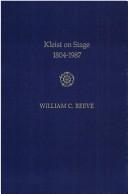
ISBN: 128285612X 9786612856129 0773563628 9780773563629 0773509410 9780773509412 Year: 1993 Publisher: London: Mc Gill-Queen's university press,
Abstract | Keywords | Export | Availability | Bookmark
 Loading...
Loading...Choose an application
- Reference Manager
- EndNote
- RefWorks (Direct export to RefWorks)
Since an account of every known staging would require several volumes, Kleist on Stage is limited to major productions in Germany, Austria, and Switzerland that attracted more than the usual press coverage, and to interpretations and adaptations outside the German-speaking countries. Reeve presents a chronological stage history of each of the plays, beginning with Die Familie Schroffenstein and ending with Prinz Friedrich von Homburg. He also discusses some of the problems faced by a director attempting to put a Kleistian drama on stage, and pleads for greater understanding and cooperation between the academic and theatrical traditions.
Theater --- Dramatics --- Histrionics --- Professional theater --- Stage --- Theatre --- Performing arts --- Acting --- Actors --- History. --- Kleist, Heinrich von, --- Kleĭst, Genrikh, --- Kleist, Bernd Heinrich Wilhelm von, --- Kleist, H. V. --- Ḳlaisṭ, Hainrikh fun, --- קלייסט, היינריך --- קלייסט, היינריך פון, --- קלייסט, הינריך פון, --- Stage history. --- Dramatic production. --- von Kleist, Heinrich
Book

ISBN: 3110270501 9783110270501 1299723020 9781299723023 9783110270471 3110270471 Year: 2013 Publisher: Berlin Boston
Abstract | Keywords | Export | Availability | Bookmark
 Loading...
Loading...Choose an application
- Reference Manager
- EndNote
- RefWorks (Direct export to RefWorks)
The impact of Heinrich von Kleist unfolds between precise depictions and moral extremes. Crystallized in words, his characters appear as paradigms of human fallibility. Their passions and obsessions, their inadequacies and longings are captured in a writing style that reveals its influence even in novels and plays of the twentieth century. This volume takes the literary reception of Kleist as one of its focal points and, furthermore, considers the author's oeuvre and his life on the occasion of the 200th anniversary of his death.
Heinrich von Kleist. --- Kleist, Heinrich von. --- Postmoderne. --- Postmodernism. --- LITERARY CRITICISM / European / German. --- Kleist, Heinrich von, --- Kleĭst, Genrikh, --- Kleist, Bernd Heinrich Wilhelm von, --- Kleist, H. V. --- Ḳlaisṭ, Hainrikh fun, --- קלייסט, היינריך --- קלייסט, היינריך פון, --- קלייסט, הינריך פון, --- Criticism and interpretation. --- von Kleist, Heinrich
| Listing 1 - 10 of 20 | << page >> |
Sort by
|

 Search
Search Feedback
Feedback About UniCat
About UniCat  Help
Help News
News